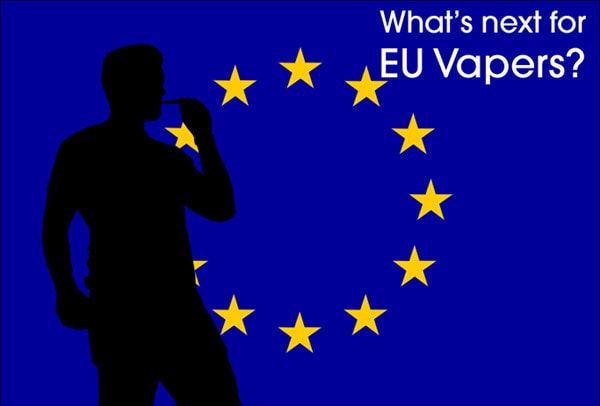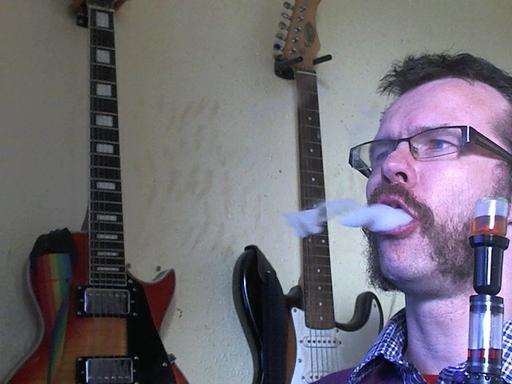
What's Next For UK and EU Vapers: 12 Top Vapers, Campaigners and Politicians Comment
by James Dunworth IndustryAfter intense lobbying from vapers, the EU last week decided not to classify electronic cigarettes as medical devices. But with the UK government intent on proceeding with a ban, and the EU still intent on banning online sales, the battle's not over. We asked 12 vapers, campaigners and politicians what's next for vapers in the UK and Europe.
1. Clive Bates, former Director of Action on Smoking and Health (ASH) UK and blogger at The Counterfactual

The right thing to do is to pause and understand what happened and why. Why were so many MEPs persuaded to vote the way they did [in the EU vote last Tuesday] and against the position of the Commission, many governments and the rapporteur? I think they have been persuaded that ill-fitting, excessive and restrictive medicines regulation of a low risk alternative to cigarettes is counterproductive, harmful to health and damaging to an emerging disruptive industry. Vapers articulated that case in thousands of communications with MEPs, the media and other interested parties. It isn't just weight of campaigning either, but also that it is authentic and strongly personal. But most importantly, they are right - their arguments convinced MEPs because they are convincing.
If vapers continue to the make case eloquently, patiently and in large numbers, the is no reason why governments will not eventually understand and listen.
2. Rebecca Taylor, Liberal Democrat MEP for Yorkshire and the Humber and one of the co-authors of amendment 170 RebeccaTaylor.eu
E-cigarettes and tobacco directive: what's next?
Last week the ALDE (Liberal group) authored amendment 170 on e-cigarettes which was adopted by the European Parliament (EP) in the plenary vote on the tobacco products directive (TPD).
The next step is that health ministers of the 28 EU national governments ("Council") will begin negotiations aimed at achieving a final agreement on the TPD with the EP. The EP negotiation team will be led by Labour's Linda McAvan, the lead MEP, along with the lead MEPs for other political groups including Frédérique Ries for the Liberals.
When it comes to key tobacco control measures e.g. health warnings, the Council position is rather similar to the EP, but on e-cigarettes, national governments agreed on medicines regulation.
On electronic cigarettes, what is needed therefore is to persuade national governments that tightening up consumer regulation of e-cigarettes can be done in a way that meets their concerns, which include accurate labelling, product quality, a ban on sales to minors and appropriate marketing.
The heat is on to get agreement on the TPD under the (July to December 2013) Lithuanian EU Presidency, and not to extend negotiations into the Greek Presidency (starts January 2014), as Greece is Europe's biggest tobacco producer with a rather weak record on tobacco control. I hope that this time pressure will work to the advantage of those pushing the case for sensible regulation of e-cigarettes.
3. Christoper Snowden, author and blogger at Velvet Glove Iron Fist

I expect to see continued exponential growth in the e-cigarette market over the next few years before the Tobacco Products Directive comes into effect. Assuming that the European Commission and their tax-funded 'public health' lobbyists don't find a way to overrule the EU parliament, the main challenges posed by the TPD will be about marketing and internet sales. I am hopeful that there will be so many vapers by 2015/16 that any form of over-regulation will be politically untenable. I am also hopeful that the decision of the EU parliament will force the MHRA into reconsidering its position.
The campaigning of vapers, decent MEPs and genuine health activists like Clive Bates has been a wonder to behold. Vapers will now be all too aware that the European Commission and the public health lobby are not their friends and that no dirty trick is too low for them. The prohibitionists and Big Pharma will now move on to putting pressure on national governments. Time is still on their side but once e-cigarette use hits critical mass, the revolution will become unstoppable.
4. Katherine Devlin from the Electronic Cigarette Industry Trade Association (ECITA)

It is vitally important to remember that the WHO Framework Convention on Tobacco Control (FCTC) is there to do what it says on the tin: to get agreement on a framework for TOBACCO control. Note that it is NOT there to interfere with NON-tobacco products.
Governments around the world have signed up to the WHO FCTC, and there is legislation in most international states specifically designed to regulate and control tobacco products. The spirit and intention of these legislative instruments is specifically designed to tackle the well-documented health problems surrounding the legal use of smoked tobacco products. This is entirely appropriate and proportionate to the risks to citizens of continuing to use combustible tobacco products. Smoking kills, after all.
Electronic cigarettes, however, are neither combustible, nor tobacco products – and as the European Parliament appears to have realised (thanks to the dedication and hard work of a notable handful of MEPs, particularly Martin Callanan, Rebecca Taylor and Chris Davies) – they are not medicinal products either. They are consumer products which represent the first real opportunity in history to tackle the ‘tobacco problem’ really effectively – but not if they are crushed out of existence in their infancy by ill-thought-out, over-burdensome regulation.
As neither tobacco products nor medicinal products, electronic cigarettes should not be included in either the Tobacco Products Directive or the Medicinal Products Directive. The European Commission needs to do the work it has not yet done, i.e. to hold a proper consultation on this specific issue, produce robust impact assessments on this specific issue, and produce a set of legislative proposals for this specific product sector. In this way, the European Institution as a whole would have the information it needs to adopt a sensible approach to the regulation of these innovative, life-saving products – and hopefully, in the process, have a significant impact on reducing the toll of disease and premature death currently occurring because of the continued failure of existing tobacco control measures. Also, this would allow for the rapid adoption of the revised TPD while this work on electronic cigarettes proceeds – with sufficient time to do it properly.
5. Dick Puddlecote: Blogger at DickPuddlecote.com
 Tuesday saw a truly momentous vote in Strasbourg. Rescuing e-cigs from an ignorant and blunt legislative sledgehammer was indeed a triumph for the lobbying power of vapers, but it would be extremely naive to think that the war has been won and that this is the end of it.
Tuesday saw a truly momentous vote in Strasbourg. Rescuing e-cigs from an ignorant and blunt legislative sledgehammer was indeed a triumph for the lobbying power of vapers, but it would be extremely naive to think that the war has been won and that this is the end of it.
While we were still celebrating, there is little doubt that the tobacco control industry had already begun holding meetings over camomile tea and pine nuts to plan their next move. They are veterans of setbacks such as this and there is too much at stake for them, by way of hefty state funding and potential dents in pharma profits, to just leave vaping alone. In fact, it is better to see the EU battle as merely victory in a small skirmish when you see the threats being directed at e-cigs worldwide. The game has barely started, so if anyone believes that they can now sit back and let common sense take over, please do think again. The price of protecting e-cigs for future generations is, sadly, eternal vigilant activism.
History is littered with single issue campaigners who gather together to fight against what they see as infringements on their property, community or liberties, but those who disband once they feel the job is done always end up losing out in the long run. On the other hand, campaigners who carry the fight on and continue to be active are invariably successful. You don't have to look any further than the tobacco control industry itself, which has gone from an unpopular and largely irrelevant lobby in the 1970s to one which now moves from one idiotic proposal to the next with full support of politicians too afraid to stand up to them.
It is now that vapers must stay strong; keep rebutting lies where you see them; continue to let politicians know of your presence and commitment; carry on providing studies and literature in favour of vaping; and occasionally play as dirty as opponents of e-cigs have proven they will do given the opportunity. Vapers have shown they are a major force to be reckoned with - now is the time to reinforce in the minds of politicians that they mess with this lobby at their peril.
6. Oliver Kershaw: Founder of ECigaretteForum
The passing of amendment 170 came as something as a surprise to me, and I'm sure many others, especially as we'd seen a resounding vote against non-medical regulations during the ENVI committee's July voting session. In all honesty, I think many of us are extremely nervous about how things proceed from here, especially as the UK still appears to have a national government that is to enter negotiations from a pro med-regs position. It's unclear to me what the liklihood of a democratic vote by the European Parliament being overturned is, but there are also 'secondary' aspects to the regulations that we need to scrutinise very closely.
In particular, just this afternoon, we witnessed a Liberal Democrat MEP on television claiming that "we don't want flavours such as chocolate and strawberry which attract children". This talking point is in danger of becoming a refuse-to-die zombie argument unless we tackle it strongly, and it's worrying that a member of a party which has been so key in overturning the meds regs is so badly briefed on such a critical point. This suggests to me that there are still deep divisions and misunderstandings regarding electronic cigarettes, and I'd expect these to be found in all political parties.
How do we as vapers tackle this? Firstly, we must gain huge confidence from what happened on Tuesday. Certain segments of the public health sector had attempted to smear us as a paid-for 'astroturf' lobby, and engaged in a dog-whistle politics aimed at tarring us with the Big Tobacco brush. Clearly they failed in this: our democratic representatives listened to the arguments, and many agreed with us. Even one month ago we couldn't say with any certainty that our arguments were being heard in the right places - I think we now can.
We must, therefore, keep on. Every vaper who has not yet contacted their elected representatives should do so now, and should outline the arguments as they see them: no letter templates - MPs/MEPs need to hear this from their constituents' own experiences. Reading Clive Bates' blog is a very good way of becoming well versed in the critical points, though! I still think we could see a flavouring ban, and bans on cross-border sales and advertising could well stay in the directive. A flavouring ban would be disastrous (and nonsensical since e-cigs are essentially a flavoured product), as flavours are one of the important elements which attract smokers and keep them from going back to tobacco smoke. So, do contact your MP as well as your MEPs as soon as you can.
7. The POTV Team from Planet of the Vapes
Planet of the Vapes feels that vapers across the European Union have scored an amazing victory on the 8th of October in the EU. However, despite the recent wins in various countries world wide, we will see future attempts in the coming years to regulate harshly, medically, and see the implementation of taxation. These will most likely be brought on in a variety of cruel and unusual ways. The government, Pharma and Tobacco industries, are big, old, and the lumbering dinosaurs of predictability.
We also will see even more people switching to ecigs, the sale of egos will continue, unabated, until/if the aforementioned deem them too deadly due to the odd one blowing up the leather upholstery of a Mail reading cabbie, which as we all know, is a far greater danger than cancer.(Insert Sarcasm!)
Ecigs future is still up in the air and we might see ecigs go through a few different channels before we settle on something that is beneficial for everyone. We think that most will probably remain as consumer products, while the larger companies will obtain medical authorisations so that they can cater to the NRT/Quit Kit market.
Whichever way this industry moves forward, we don't think this is "over" yet. There are still many political and medical professionals out there spewing propaganda contradicting the facts and studies available. Vapers world wide must maintain our fight against unnecessary heavy handed regulation as well as counter the untruths with correct information.
8. Ghyslain Armand from MA Cigarette

All our efforts during the past two years and the recent protest hundreds of European vapers demonstrated in front of the EU Parliament seemed to have trigger politics attention. The latest figures coming from tobacco sales in France (-8% for the last quarter) probably also helped health specialists to wake up. Fortunately, they are becoming more and more enthusiastic about the potential of this harm reduction method. Today we avoid one of the most critical threats to the product (pharmaceutical regulation). Unfortunately the fight to protect our right to vape is not over and we're facing now advertising ban and restriction to vape in public places.
Putting e-cigarettes on the same level than cigarettes in the way we are allowed to use it and talk about it represents a real barrier to its accessibility. To properly compete with tobacco cigarettes, electronic cigarettes still have to be more available, cheaper and keep their variety while staying away from non-smokers and young people. The matter is not simple and the upcoming political discussions, both on a European level and local level here in France, will be crucial for the future of the product. Thanks to consumers associations such as AIDUCE and professionals like the CACE, as well as public health specialists, I'm pretty confident our government will find a rational and balanced way to regulate the product for the benefits of all French smokers.
9. Scott Bonner from E-Cig-Reviews

It was inevitable that some regulation would apply eventually, however I think the vaping community and its active campaigners have done well thus far in helping to lessen those legislations effects. Just a short while ago there was a dark cloud of uncertainty hanging over our heads, but now the future of vaping looks a lot brighter and from this point onwards continuation of the success can be built upon using positive, non confrontational promotion to ensure that vaping is here to stay for a very long time to come.
10. Chris Price from ECigarette Politics

The EU Plenary vote was a sweet victory, all the more so since it was unexpected (I admit to being one of those who thought it wouldn't happen). The size of the vote for us, 362 to 298, is surprising. It demonstrates that in fact the community do have a chance, even when fighting the endemic corruption in the EU (and if you don't understand that last bit, please consider that 298 MEPs in effect voted to kill millions of EU citizens, and to suggest that commercial or economic pressures did not play some part in that, at some level, would be extremely naive).
However this is only one of the four votes we must win in order to remove medicalisation of PVs from the table: ENVI (against us), Plenary (for us), Council of Ministers (certain to be against us: I predict about a 22 - 6 loss for us there), and finally Parliament (??). In addition we don't know what the procedure will be when the Plenary have voted one way and the Council the opposite way: does this mean a delay? Some sort of compromise? A restart of the whole process? Clive Bates suggests the best option might be to scrap the process and start again, and I tend to agree - if this is possible.
Then we must consider the possible eventual results: 1. Medical classification succeeds 2. Medical classification fails, and the EU uses Tobacco classification against us instead 3. The MHRA goes ahead anyway
In the case of #1, it is likely that a legal challenge would succeed (eventually), and medicalisation would be overturned. It is unlikely, though, that such a victory would be immediate: there could well be a period in which medicalisation is the law, before trade organisations such as ECITA and TVECA could overturn it. We saw that in the USA; so a year with a total ban in place is not impossible.
If #2 pertains, the EU will use tobacco regulations to try to do the same job: eliminate ecigs. They have to, as that's what they're being paid to do (the EU works for industry and government, not the citizen and obviously not for public health). Eventually, such regulations could be harsh enough to do 99% of the job that medicalisation would do.
If medicalisation fails at EU level, then perhaps #3 is possible: the MHRA will proceed with medicalisation at national (UK) level. ECITA would almost certainly be able to overturn this, since there is so much case law. Nevertheless, there might be a period in which a ban is in place.
All this will have been resolved in twenty years because this will certainly be a voting issue by that time, and 20% of the population do get listened to (look at the effect a 15% swing to UKIP in the local elections had: abject terror in the main three parties). But that's then, and this is now. There's going to be plenty of pain until then. The smoking economy is worth over $1 trillion a year and is well able to protect itself.
The rule of technology change states unequivocally that the result is inevitable, but the timescale is a variable. We now know exactly what will happen: ecigs will all but eliminate smoking - but how long it takes depends on how strong a rearguard action the old system puts up.
Bill Godshall stated in 2011 that ecig sales will overtake cigarette sales within a decade. I used to think he was way too optimistic; but he's generally right. I used to think that ecig uptake would slow down from its phenomenal rate - but if anything it's speeding up.
Basically I foresee a black market in most places, of varying size according to the exact regulations that will be implemented, because what the establishment will permit is going to be far less than what people want - and for a very long time. There's just far too much money at stake for the system to allow us what we want, and the money always wins. You only have to look at Snus to see what I mean: huge public health gains prohibited, and at least 70,000 needless deaths in the EU every year (10% of the smoking death toll) that are clearly of no concern whatsoever to those in power.
11. Darren Johnson: Vapour Trails TV Presenter
To have amendment 170 pass in our favour was a massive triumph. We certainly won our battle for the last ten months, but the war is far from over.
It is absolutely clear that whilst at the moment we seem to be safe, we need to make this absolutely concrete This is just one hurdle we have over come, but it yet has to be put to ministers and MEP's to look into further before they look to finalise and pass law, before that law will be passed throughout the european community to be placed in each countries law.
We as vapers did an excellent job advising our MEP's on how efficient, electronic cigarettes are, we told our stories about what they have done for us. Now we need to be doing exactly the same to our MP's no matter which party they belong to, we need to tell our story in our own words and make them see how much benefit these actually are. I have already heard back from people who are meeting up with their MP's, but some are stating that they are finding it hard to make such a meeting to take place, all I can say to that is do not accept, it keep writing and demand an audience with them, the more you do the more you will be heard.
12. Sam Munro
In Europe , the acceptance of amendment 170 of the Tobacco Products Directive allows the Vaping community to breathe a sigh of relief. But as always, within the UK we can't rest on our laurels. Although we achieved success with 170, the voting stats for McAvan's amendment 71 which would have seen medical regulation being adopted. Many UK MEP's voted in favour of this, and only when it failed, did they show support for 170. From a local perspective (In Scotland) Only one out of the 6 voted both against am71 and FOR am170. That was George Lyon a LIbDem MEP, I know where my vote will be going in the next EU election.
Lesley Anna Lawless (Visit Twitter Profile: LeeAnnaLawless)
In 2010 the MHRA planned to remove all ecig products from the shelf within 21 days. The reason that didn’t happen was a general election and a new body that said the MHRA had insufficient evidence and to come back when they had it. In June this year they did so, recommending medicalisation, with no new evidence apart from some old studies by BAT. It would only be possible to do so if the EU TPD permitted this and the announcement was made at a crucial time in the ENVI debate.
The ALDE (Liberal) group in the ENVI committee had a good amendment, but unfortunately it was defeated and ENVI voted for full medical regulation of ecigs.
Vapers throughout Europe have been sending petitions, writing letters and visiting their MEPs in an attempt to educate them. The TPD is being rushed through and so an alternative amendment had to be created that would gain broad political support. This resulted in amendment 170 in the EU parliament.
This amendment is better than making ecigs medical devices but leaves a lot to be desired. Although e-liquid is neither a tobacco product or a medicine the EU have passed regulation that is a mixture of medical and tobacco legislation, and that is not good for vapers.
No advertisements will be permitted, meaning fewer smokers learning about this new technology that is orders of magnitude safer than tobacco. Cross-border sales will be banned, meaning that many countries that import from within the EU will no longer be able to do so. Internet sales may be banned, which would make it impossible for a large percentage of the population being unable to obtain e-liquid, or only be able to buy the 1st generation cigalikes sold in the UK in supermarkets and corner stores.
This amendment, passed by the EU parliament in two sections, the second being whether or not to permit flavours, passed with a majority of approximately 100, and the medical ecigs preferred by the commission, council and ENVI committee was defeated. But it is a compromise. So if a claim is made that an ecig can be used for smoking cessation in the same way as NRT it has to be medical. For some reason any nicotine contents above 30mg/ml would also need a medical license. How 29mg/ml is recreational and 31 mg/ml is medical escapes me and most vapers. Maybe because that is the average of all EU countries, from those that banned nicotine in ecigs to the UK permitting up to 75 mg/ml to be sold without a poisons license. Of course 70mg/ml could never be classed as medical as a device to give an exact dose would be required and such high concentrations are used by DIY mixers, diluted down to the desired strength.
It has been accepted that the lethal dose of nicotine is 30 to 60 mg/ml, but at last this claim has been studied and traced back to 19th century pharmacists experimenting on themselves. A far more scientific figure has recently been published, which says that the lethal nicotine dose for an adult is between 500 and 1000 mg/ml. Maybe that will influence the limit, but it is unlikely to do so.
The problem with a 30 mg/ml maximum, apart from making it extremely difficult for those who mix their own e-liquid for their own use, is that the minority who use high concentrations will no longer be able to do so. Most vapers use between 18 and 24 mg/ml and Dr. Farsalinos says that a pack a day smoker needs at least 24mg/ml to keep them away from cigarettes. I am one of those that often use higher concentrations, 36mg/ml in the mornings, and that would be impossible to buy. Presumably e-liquid manufacturers with a poisons license will still be able to buy more concentrated base in order to make e-liquid, because if not their costs would increase and flavours would either be weak or use only super-concentrated versions in order to produce 24 mg/ml e-liquid.
Advertising will be banned, as with tobacco. That means less smokers would discover ecigs. It is likely that vaping would be banned where smoking is banned; removing the main way that informs smokers so that they switch. Cross-border sales will be banned (tobacco law) which would be likely to starve some EU countries of high-quality nicotine. There is a possibility that internet sales will also be banned.
Electronic cigarettes are a truly disruptive industry for both tobacco and NRT companies. It is estimated that if the business is allowed to grow with only necessary regulation, cigarette smoking could be at least halved in ten years time.
But we now have to go through the trilogue process, where the Council of Ministers, the Commission and the Parliament have to reach a compromise. Although we succeeded in educating enough MEPs by petitions, letter writing, demonstrations and visits, to get this amendment passed by the EU Parliament, this is only the first battle and we are a long way from winning the war. All vapers, their families and friends, should write, and visit, their local MPs, as the Council is composed of the ministers of member states. Linda McAvan, ENVI rapporteur, has the task of arranging this compromise and she wants medical regulation for all ecigs. In the initial Council discussion they wanted to reduce the recreational content of nicotine to 2 mg/ml, the Commission 4mg/ml.
If the eventual law permits stricter regulations by Member States the MHRA intend to continue with full medicalisation. I know of no country that took that route ever agreeing to a medical ecig, in fact the way people vape makes it impossible to medicalise them and keep them effective.
E-cigarettes will be regulated, and I welcome reasonable and proportionate regulation to ensure purity, safety and the banning of sales to those who are below the smoking age. But anything else will destroy the ecig as we know it and either force us onto a black market or back to smoking. Personally I smoked 40 to 50 a day for 50 years and am very afraid of my ecigs being taken away from me. Medical ecigs will not mean that you can get an advanced device and your choice of liquid on prescription.
That is why, although we have been vilified as ‘astroturf’ and ‘tobacco lobbyists’ all vapers and anybody else who believes that vaping is better than smoking should contact their MP, their MEP, those who lead groups in the EU Parliament, the media, everything that will get our story to those in power. If we can meet our representatives we need to bring our equipment to show and explain, as few of them know anything about ecigs, modern ones especially.
We have performed a miracle. A month ago nobody thought we had a chance of influencing the EU Parliament. But we succeeded to some extent through education.
The war has just begun and we may be weary but we dare not rest. Every MEP and MP throughout Europe should be contacted politely, shown and told the facts of vaping, given the new positive research.
If all vapers and their friends and relatives do that, so our chance of winning increases. The EU elections in May could help our cause there.
Conclusion
The battle is not over yet. We may have won over the medicalisation issue in the EU, but the UK government still aims to ban e-cigarettes, and the EU still aims to ban online sales.
But if there's one thing that the EU vote showed us, it's that us vapers can make a difference. And not just vapers - the family and friends of vapers who have seen the difference electronic cigarettes can make to their loved ones lives. (A case in point - the assistants of one MEP I met with both had family who had switched from tobacco cigarettes to electronic cigarettes - and both appreciated the importance of keeping electronic cigarettes available.)
Write to your MPs and your MEPs, because if enough of the estimated 1,300,000 vapers in the UK do so, we WILL win the battle for our e-cigarettes.




